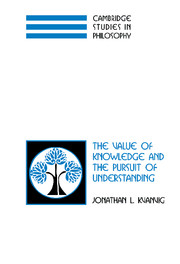Book contents
- Frontmatter
- Contents
- Introduction
- 1 The Value of Knowledge Is External to It
- 2 The Value of True Belief
- 3 The Value of Justification
- 4 Reliabilism, Normativity, and the Special Promise of Virtue Epistemology
- 5 The Gettier Problem and the Value of Knowledge
- 6 Knowledge as Irreducibly Valuable
- 7 Epistemic Attitudinalism: Semantic and Pragmatic Approaches
- 8 Knowledge and Understanding
- 9 Conclusion
- References
- Index
6 - Knowledge as Irreducibly Valuable
Published online by Cambridge University Press: 14 August 2009
- Frontmatter
- Contents
- Introduction
- 1 The Value of Knowledge Is External to It
- 2 The Value of True Belief
- 3 The Value of Justification
- 4 Reliabilism, Normativity, and the Special Promise of Virtue Epistemology
- 5 The Gettier Problem and the Value of Knowledge
- 6 Knowledge as Irreducibly Valuable
- 7 Epistemic Attitudinalism: Semantic and Pragmatic Approaches
- 8 Knowledge and Understanding
- 9 Conclusion
- References
- Index
Summary
It will be helpful to take a moment to reflect on where we are in our study of the value of knowledge. We began with the assumption that knowledge is valuable, arguing that this assumption is one of two central desiderata on any adequate theory of knowledge. First, an adequate theory of knowledge must give a correct account of the nature of knowledge. Second, an adequate theory of knowledge must account for the value of knowledge.
After defending the Socratic view that the value of knowledge is not to be found in relation to the practical realm or to other things external to knowledge, we pursued the idea that we should seek its value among its constituents. Traveling this path has led to some useful results, including accounts of the value of true belief, subjective justification, and displays of intellectual virtue. We have had to conclude, however, that this path fails to lead us to our destination, for the Gettier problem raises issues that give us reason for pessimism. In particular, we have seen grounds for thinking that a clause aimed at solving the Gettier problem will not cite some further constituent of knowledge that is valuable that explains how knowledge is more valuable than subsets of its constituents.
This conclusion has been anticipated by Timothy Williamson in a passage quoted in the previous chapter, and his reaction to it is instructive at this point in our inquiry. He says:
Even if some sufficiently complex analysis never succumbed to counterexamples, that would not entail the identity of the analysing concept with the concept knows. Indeed, the equation of the concepts might well lead to more puzzlement rather than less. For knowing matters; the difference between knowing and not knowing is very important to us.
- Type
- Chapter
- Information
- The Value of Knowledge and the Pursuit of Understanding , pp. 140 - 156Publisher: Cambridge University PressPrint publication year: 2003



